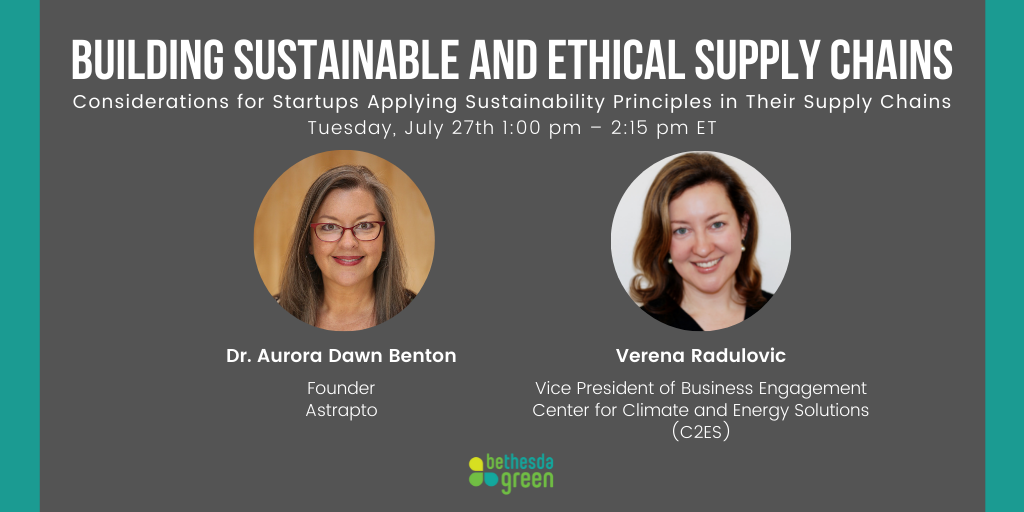2021 Summer Speaker Series: Tackling Environmental Challenges Through Sustainable Entrepreneurship
Building off the success of last year’s summer speaker series, Bethesda Green’s Innovation Lab is once again bringing together founders, industry experts, and policy makers for a series of conversations that will inspire and educate all who attend.
During our 2021 Summer Speaker Series, 14 industry experts are coming together to discuss two primary topics: 1) Building Sustainable and Ethical Supply Chains and 2) Measuring Impact and Managing Risk.
The following is a summary of the second session hosted on TUESDAY, JULY 27TH.
Session #2: Considerations for Startups Applying Sustainability Principles in Their Supply Chains
Panelists included Dr. Aurora Dawn Benton, Founder at Astrapto, and
Verena Radulovic, the Vice President of Business Engagement, Center for Climate and Energy Solutions (C2ES).
Watch the full session on YouTube here:
https://www.youtube.com/watch?v=9vzr1bU23ak

We welcomed Dr. Aurora Dawn Benton, the founder of Astrapto, and Verena Radulovic, the Vice President of Business Engagement at the Center for Climate and Energy Solutions, to discuss the hurdles startups and small businesses face when trying to incorporate sustainability into their supply chain. Below, please find a collection of some of the key takeaways from this conversation.
Elevate Your Company’s Core Values. One way for a company to signal to stakeholders that it prioritizes sustainability through its value chain is to elevate sustainability principles within the company’s core values early on. Clearly stated values can not only attract customers and employees who align with the company’s mission, they can serve as a guiding light for the company as it navigates difficult and complex decisions, including about its supply chain.
Early stage companies that are often strapped for resources may find that they need to make concessions once in a while in order to keep the lights on. Our panelists suggested that founders tackle one supply chain challenge at a time, letting the company’s stated core values drive their decisions wherever possible. As a company grows, it can address weaknesses in its supply chain, and increasingly work to promote sustainable solutions throughout.
Communicate Your Impact. Founders should always remember to communicate their efforts to improve their environmental footprint with their stakeholders. Our panelists recommended that founders focus their efforts on areas where they can have the most impact. For small businesses, key areas are often electricity usage and transportation. While an individual company’s sustainable decisions might make a relatively small impact, the collective impact of hundreds of small businesses that come together to ask their area’s utility provider for renewable options, for instance, would be substantial.
Founders may also want to consider broader environmental impacts beyond greenhouse gas emissions, too. Our panelists suggested that founders Identify and make the most of their local infrastructure, and determine what is within their purview and control. In some cases, this may require choosing the lesser of two evils to meet a need and take advantage of infrastructure capacity to support new technologies. Case in point: even with the plethora of packaging solutions to reduce the use of plastic such as compostables, biodegradables, bioplastics, etc., consumers are still often confused about how to properly dispose of them and oftentimes localities lack the infrastructure to handle these newer materials.
Collaborate. It’s common for companies in the same industry to face similar supply chain challenges, and joining forces with others can be a powerful way to address them. Associations like the Climate Collaborative, a coalition of “manufacturers, retailers, distributors, brokers, suppliers, and other concerned businesses from the natural foods industry working collaboratively to take bold action to reverse climate change,” can connect member companies with each other and provide them with the resources to create greater opportunities to identify solutions. Such partnerships also enable members to stay engaged in the global discourse around sustainability.
Understand Supply Chain Players and Power Dynamics. Our panelists agreed that it’s important for founders to thoroughly understand the external pressures and competition that exist both upstream and downstream on their supply chains in order to be able to quickly identify challenges and make plans to address them.
They reminded founders that companies of all sizes can play a part in reducing global emissions and creating a more sustainable future. Small companies may vye to become a vendor for a larger multinational, and large companies may be just one customer for a supplier.
Help Customers Meet Sustainability Goals. A small company can become a valued and preferred supplier for big companies by prioritizing sustainability, since it can help a larger corporation meet their sustainability goals and commitments. Founders who address sustainability early on will also be in a better position so comply with increasing consumer and regulatory pressure to reduce emissions.
As large companies are increasingly asked to disclose their financials around physical and transition (customer changes, investor pressures, political) risks, suppliers who are aligned and in-step with larger trends signal to their customers that they’re prepared to respond to the rapidly changing business environment. For instance, companies are increasingly asked to report on Scope 1, 2, and 3 emissions, a company’s direct emissions from owned/controlled sources, its indirect emissions from purchased electricity, steam, heating, and cooling, and its emissions occurring in the value chain. By working with suppliers who are prepared to engage in that conversation, larger companies can better tackle the areas that need to be addressed.
Promote a Culture of Learning. Finally, our panelists reminded founders that this is a continual learning process because this is a continually evolving space, and team members should feel empowered to ask questions, raise concerns, and share suggestions about how to do things better. Such a culture that allows for improvement and innovation starts at the top, and can permeate everything a business does. A company’s desire to learn and improve can be baked in and included in job descriptions, RFPs, and performance reviews, and may help them access data and feedback from supply chain channels in order to understand where they have room to improve.
Bethesda Green’s Summer 2021 Speaker Series: Tackling Environmental Challenges Through Sustainable Entrepreneurship continues through August 26th.
Learn more about our upcoming panels and register here.
About the Authors:
Caroline Davenport joins the Bethesda Green team as the Innovation Lab’s Impact Intern. She will graduate in December 2021 from the University of Maryland with a Bachelor of Arts in Public Policy and minors in Spanish and Sustainability.
Patty Simonton is the Director of Be Green Business at Bethesda Green, where she manages the Innovation Lab.




